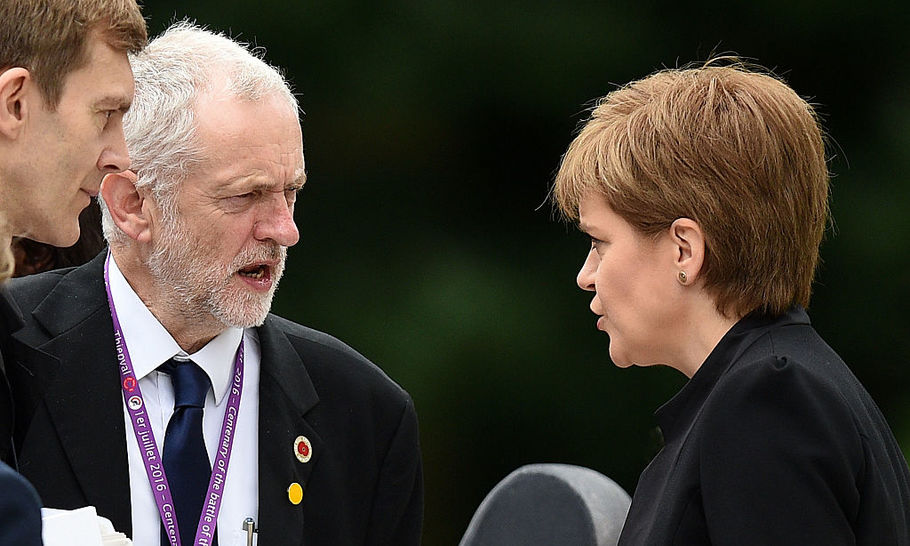Labour and the SNP would risk breaking up the UK. Does anyone really want that?

Nicola Sturgeon and Jeremy Corbyn, 2016. (Andrew Matthews – Pool/Getty Images)
One of the few things that unites all the party leaders is the belief that this election is the most important in a generation. If that were indeed the case, though, why has the campaign been so singularly lacklustre? It is hard to recall anything memorable, so far at least. The public knows that much is at stake, but seems unimpressed by the politicians and their promises. Next week’s biggest unknown could prove to be voter apathy.
Yet the turning point may already have happened, unnoticed by pollsters and pundits alike. That moment took place when Nicola Sturgeon made it clear that her price for propping up a minority Labour Government in Westminster would be a second referendum on Scottish independence.
It does not matter how many times Jeremy Corbyn pretends to rule out such a deal with the Scottish National Party. Everyone knows that in the event of a hung Parliament, he would do anything to get his hands on the keys to Downing Street. If this were the only deal on offer from the SNP, the Labour leader would swallow his pride and do it.
A YouGov poll of Scotland in the Times shows how Labour has come to this pass. The party that ruled unchallenged north of the border for decades now languishes on 15 per cent, barely more than half of the 28 per cent of Scots who say they will vote Tory. On this showing, Scottish Labour will be reduced to a single seat, while the Conservatives can expect to hold onto most of the 13 seats they won and the SNP to regain 11 of the 21 seats they lost in 2017.
Gone are the days when many of Labour’s leading statesmen were Scots, from the party’s early years under Keir Hardie and Ramsay MacDonald to its most triumphant era of the Nineties and Noughties when it was led by John Smith, Tony Blair, Gordon Brown, Robin Cook, Alistair Darling, Donald Dewar and many more. Now not even most Scots could name the Scottish Labour leader. (His name, for those who are interested, is Richard Leonard and he is a Yorkshireman.) As for Jeremy Corbyn: canvassers report that his name is most frequently cited on Scottish doorsteps as a reason for not voting Labour.
In a tight election — which, despite a national Tory lead of nine points, this one may yet be — much could turn on the Scottish result. It will be decided in the many marginal constituencies where local circumstances make them hard to predict. Interestingly, almost half of all Scots (49 per cent) think Brexit is the most important issue, far more than independence and the economy (both 28 per cent).
The evidence suggests that while some Scots might like to be consulted again on EU membership, at least two thirds are unenthusiastic, at least, about the prospect of another referendum on the Union just six years after the last one, which they were told would settle the matter for a generation. By campaigning for a rerun of both plebiscites in a single year, the SNP seems to be risking a backlash from Scottish voters.
Such a backlash in Scotland would be as nothing, however, compared to the collective groan that would be heard south of the border. Under Corbyn, Labour has become a largely English party whose activists may not mind about breaking up the UK if it enables them to create a socialist utopia in the remaining three nations. Among the British public as a whole, however, the idea of a repetition of the 2014 referendum on Scottish independence is about as enticing as a post-Hogmanay hangover.
English voters, who make up five-sixths of the British electorate , have had several weeks to digest the near-certainty that a Labour-SNP coalition or pact would mean not one but two unnecessary referenda next year. Those who are still floating are unlikely to vote for such an outcome, however much they may dislike the Tory government.
It is unclear whether even the most vociferous advocate of another poll on independence, the Scottish First Minister herself, privately wants it to happen. Independence was really the project of her predecessor, Alex Salmond, and other hardliners in the SNP. Now Salmond, who lost his Westminster seat in 2017, is charged with 14 separate sex crimes including attempted rape. It is fortunate for the SNP that the election is happening before its former leader has his day in court in what promises to be the most sensational trial in modern Scottish history.
A very senior Scottish Labour politician was heard to say this week: “Nicola Sturgeon no more wants another referendum on Scottish independence than I do.” If that is true, as it very likely is, then why on earth would she inflict such an ordeal on Scotland? And why should anyone vote for a Labour leader who would risk breaking up the UK?





